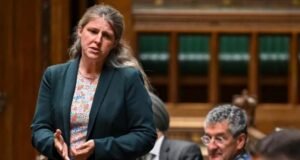
Theresa May is giving MPs another chance to vote on Brexit in early June – whether or not the government and Labour have reached a deal by then.
A vote on the bill that would pave the way for Brexit was “imperative” if the UK was to leave the EU before MPs’ summer recess, Downing Street said.
Labour sources say they will not back the bill without a cross-party deal.
If Mrs May’s plan is defeated, Number 10 said the UK is set for no deal or for Article 50 to be revoked.
That is because the EU will not grant a further extension beyond 31 October, says BBC assistant political editor Norman Smith.
Brexit Secretary Stephen Barclay also said the deal the PM negotiated with the EU would be “dead” if the bill did not pass.
Attempts to find a cross-party compromise began after Mrs May’s Brexit deal was rejected three times by MPs.
But government sources have told the BBC that there would not be a further attempt if the plan is rejected.
The vote – which will take place when MPs return from half-term recess – would bring the withdrawal agreement into UK law via the Withdrawal Agreement Bill.
The prime minister has negotiated a withdrawal agreement with the EU, which MPs have effectively rejected three times in Commons votes.
No 10 described Tuesday evening’s discussions between Mrs May and Mr Corbyn on Brexit as “both useful and constructive”.
Mrs May had made clear the government’s “determination to bring the talks to a conclusion and deliver on the referendum result to leave the EU”, a spokesman said.
A Labour party spokesman said Mr Corbyn had “raised doubts over the credibility of government commitments, following statements by Conservative MPs and cabinet ministers seeking to replace the prime minister”.

He said the Labour leader had called for “further movement” from the government and the prime minister’s team would bring back “further proposals tomorrow”.
Bringing the EU Withdrawal Agreement Bill forward would allow the prime minister to push ahead with her ambition of delivering Brexit before the summer – despite the lack of agreement so far in the cross-party talks, said BBC political correspondent Iain Watson.
Brexit Secretary Steve Barclay said: “It is now time for Parliament to make a decision, reflecting the manifestos of both the Conservative and Labour parties at the last general election and to deliver Brexit in the way that the public were promised.”
In the 2017 general election, the two main parties promised in their manifestos to respect the result of the Brexit referendum.
International Trade Secretary Liam Fox said that if MPs do not vote for the government’s Brexit plan next month, then it will “take us to either the potential of revocation of Article 50 or leaving without a deal”.
He said MPs will have to decide “if they want to vote for Brexit or not”.
Brexiteer and Conservative MP Steve Baker said bringing the bill forward “over the heads” of DUP MPs – on whom the government relies for a majority – would “eradicate the government’s majority”.
“What is the government thinking?” he asked.
DUP Westminster leader Nigel Dodds said: “If the prime minister brings the withdrawal bill to the Commons for a vote, the question will be, ‘What has changed?’.
“Unless she can demonstrate something new that addresses the problem of the backstop, then it is highly likely her deal will go down to defeat once again.”
The backstop is the controversial part of the withdrawal deal that aims to ensure an open border on the island of Ireland if the UK leaves the EU without securing an all-encompassing deal.
It’s not exactly the same thumbs up or thumbs down that another meaningful vote would be. That is a straightforward yes or no to the divorce deal that the prime minister negotiated with the EU.
This time, it will be the Withdrawal Bill which is a whole tome of new laws that will be needed to take us out of the European Union.
The draft of that bill is still being kept under wraps. Very, very few people have seen it. It’s much more detailed than just a vote on the agreement would be.
Of course, that gives people more things to object to.
Although Theresa May might have pleaded in cabinet that people on all sides have to move away from absolutism, and move to a mood of compromise, there’s not much sign of it.
As and when that bill actually emerges, that may well – in the words of one cabinet minister – make things worse before they can get better
The UK needs to pass a law to implement the withdrawal agreement – the part of the PM’s Brexit deal which will take the country out of the EU – in UK law.
This is a requirement under the terms of previous Brexit legislation passed last year.
The legislation would make the citizens’ rights part of the agreement directly enforceable in UK courts, and set their relationship with the EU’s Court of Justice.
It will also allow ministers to make “divorce payments” to the EU foreseen under the current deal, and give effect to the so-called backstop plan for the Irish border.
MPs will be able to vote on amendments to the bill, and this could allow ministers to make good on any compromise they reach with Labour in the cross-party talks.
If the bill is introduced in the first week of June it will come seven days after the European Parliament elections – which Education Secretary Damian Hinds has acknowledged could be “difficult” for the Conservatives.
A state visit by US President Donald Trump and a by-election in Peterborough will also take place that same week.
 Weekly Bangla Mirror | Bangla Mirror, Bangladeshi news in UK, bangla mirror news
Weekly Bangla Mirror | Bangla Mirror, Bangladeshi news in UK, bangla mirror news







